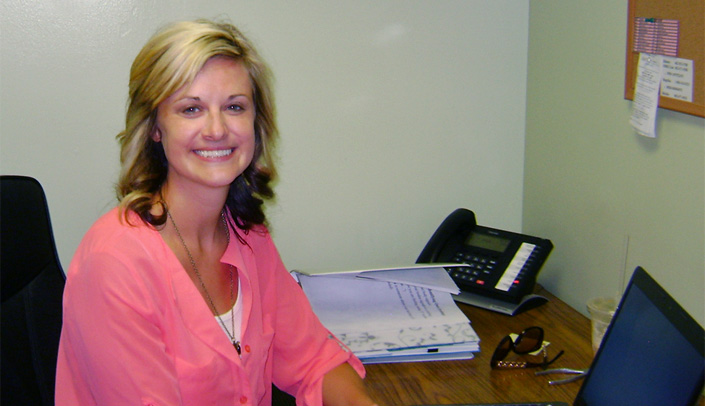Darcy Dawson always knew that she wanted to live and work in a small town.
In order to finish her master’s degree in community counseling at Doane College, the Bruning, Neb., native needed to complete 1,000 hours of internship training to realize her goal of becoming a licensed mental health professional.
She was accepted into an internship program at UNMC’s Munroe-Meyer Institute and assigned to a pediatric clinic in Fremont, Neb. It turned out to be a perfect way to jumpstart her career.
After completing her residency at a Lincoln agency for a year, she accepted a part-time position in a family medicine clinic in York, Neb., working two days a week seeing patients referred by family physicians in her clinic. She and her husband, Paul, live on an acreage near Fairmont, Neb., about 20 miles south of York.
“It’s exactly what we wanted,” Dawson said. “We love the rural area and I enjoy my job. It’s great to help people going through psychological issues.”
Dawson’s situation illustrates one example of how UNMC is attempting to address the critical shortage of mental health professionals in rural Nebraska.
It’s no small task. In some parts of the state, there are no mental health practitioners for literally hundreds of miles. With mental illness striking one in five Americans this year and about half of all Americans experiencing a mental health problem at some point in their life, a perfect storm is brewing in rural Nebraska.
“It’s a huge challenge,” said Howard Liu, M.D., a child and adolescent psychiatrist for UNMC and interprofessional education director for the Behavioral Health Education Center of Nebraska (BHECN). “Our best chance for getting more mental health professionals for rural Nebraska lies with students from rural communities. If we can expose them to rural medicine, that’s our best way to get them to return to a rural community.”
Dr. Liu and his counterpart at the psychology program for the Munroe-Meyer Institute, Joe Evans, Ph.D., are hoping that rural training programs through BHECN will provide some relief to smaller communities in need of mental health professionals.
Through BHECN’s rural psychiatry residency program, each of the 36 UNMC/Creighton psychiatry residents spend one month of their residency in a rural hospital. BHECN also sponsors 13 graduate students in psychology, psychiatric advanced practice nursing, social work, and counseling to spend an entire year in a rural community.
BHECN collaborates with a variety of behavioral health education programs at UNMC and at universities across the state, including Chadron State, Doan and the University of Nebraska at Kearney.
The MMI psychology program has two federal training grants for placing doctoral interns into rural and underserved urban areas. MMI program graduates are now providing behavioral health services to children and families in 19 rural Nebraska towns (including Dawson’s clinic in York) and in 13 clinics in the Omaha and Lincoln metropolitan areas. Next year, MMI psychology trainees will be providing “learning through service” behavioral assessment and interventions in Chadron, Nebraska City, Kearney, Grand Island, Columbus and Hastings.
In addition, BHECN and MMI jointly support practicum and internship training for 18 trainees annually from other behavioral health professions including social work, counseling, marriage and family therapy, and psychiatric nursing.
“The opportunities are endless,” said Nathan Bruce, D.O., a fourth-year resident who did his training at a clinic in Kearney, Neb.
“When it comes to mental health, rural patients typically are much sicker. They don’t have access to the type of mental health care that someone would receive in Omaha.
“You see a wide variety of psychiatric problems, such as psychosis, depression and catatonia.
“There’s also a major methamphetamine problem in rural Nebraska, which can lead to serious mental health consequences.”
But, in Dr. Bruce’s assessment, the rural residency program is definitely a step in the right direction.
“I know the hospital administrators in Kearney and Hastings, and they are grateful to have UNMC residents there,” he said.
“They see it as a recruiting tool. It’s a win-win for everyone.”
